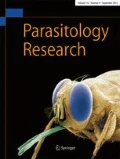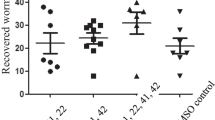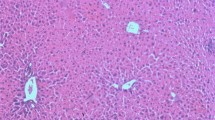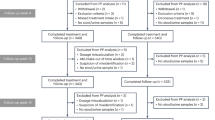Abstract
The purpose of the study is to explore the efficacy of mefloquine administered orally at single, multiple doses, or in combination with artesuante, artemether, or praziquantel in mouse—Schistosoma japonicum model. A total of 205 mice were divided into 4 batches and each batch of mice was infected percutaneously with 40 S. japonicum cercariae for 35 days. The infected mice were treated orally with mefloquine at single doses, multiple daily doses, or combined with artesunate, artemether, or praziquantel, while infected but untreated mice served as control. All treated animals were killed 4 weeks post-treatment for assessment of effect. When infected mice were treated orally with mefloquine at single or multiple daily doses under the same total dose levels, the tendency to decrease the efficacy was seen. Particularly, when a lower single dose of 100 mg/kg was divided equally into five daily doses of 20 mg/kg, the efficacy decreased statistically significant (P < 0.05), i.e., the total worm and female worm reductions of 67.9% and 73.4% decreased to 31.3% and 30.3%, respectively. In infected mice treated with mefloquine or artesuante at a single dose of 100 mg/kg, a moderate effect against schistosomes was observed. No further significant reduction of total and female worm burdens was seen, when the two drugs combined together at the same dose level. On the other hand, administration of mefloquine combined with artesunate at single dose of 50 mg/kg, which exhibited no effect against schistosomes, resulted in significant reduction of total and female worm burdens in comparison with the groups treated with mefloquine and artesunate alone at the same dose level. Similar results were observed in treatment of infected mice with mefloquine in combination with artemether at the smaller dose of 50 mg/kg. The total worm burden was significantly lower than that of control and the female worm burden was also significant lower than that of groups treated with mefloquine and artemether alone. Interestingly, in administration of mefloquine 100 mg/kg combined with artemether 100 mg/kg to the infected mice, all female worms were killed and the total worm burden was also statistically significant lower than that of groups treated with either drug alone. Finally, when infected mice were treated with mefloquine combined with prazqiuatel at single dose of 50 mg/kg, no apparent improvement in efficacy was seen. Administration of mefloquine 100 mg/kg combined with praziquantel 100 mg/kg, only the difference of female worm burdens between praziquantel group and combined treatment group was statistically significant. The results indicate that under the same dose level of mefloquine, the efficacy of single dose is superior to that of multiple daily doses; mefloquine combined with artesunate or artemether at an invalid or moderate effective dose may show synergistic effect, especially the effect against female worms; no prominent synergistic effect is observed, when the similar dose level of mefloquine in combination with praziquantel.
Similar content being viewed by others
References
Alkadi HO (2007) Antimalarial drug toxicity: a review. Chemotherapy 53:385–391
Dabo A, Doucoure B, Koita O, Diallo M, Kouriba B, Klinkert MQ, Doumbia S, Doumbo O (2000) Reinfection by Schistosoma haematobium and S mansoni despite repeated praziquantel treatment in office du Niger (Mali). Med Trop 60:351–355, Mars
Danso-Appiah A, de Vlas SJ (2002) Interpreting low praziquantel cure rates of Schistosoma mansoni infections in Senegal. Trends Parasitol 18:125–129
Desjardins RF, Pamplin C III, Bredow J, von Barry KG, Canfield CJ (1979) Kinetics of a new antimalarial, mefloquine. Clin Pharmacol Ther 26:372–379
Doenhoff MJ, Hagan P, Cioli D, Southgate V, Pica-Mattoccia L, Botros S, Coles G, Tchuem Tchuenté LA, Mbaye A, Engels D (2009) Praziquantel: its use in control of schistosomiasis in sub-Saharan Africa and current research needs. Parasitology 136:1825–1835
Fenwick A, Rollinson D, Southgate V (2006) Implementation of human schistosomiasis control: challenges and prospects. Adv Parasitol 61:567–622
Keiser J, Chollet J, Xiao SH, Mei JY, Jiao PY, Utzinger J, Tanner M (2009) Mefloquine—an aminoalcohol with promising antischistosomal properties in mice. PLoS Negl Trop Dis 3:e350
Keiser J, N’Guessan NA, Adoubryn KD, Silue KD, Vounatson P, Hartz C, Utzinger J, N’Goran EK (2010) Efficacy and safety of mefloquine, artesunate, mefloquine-artesunate, and praziquantel against Schistosoma heamatobium: randomized, exploratory open-label trial. Clin Infect Dis 50:1205–1213
Li SW, Wu LJ, Liu ZD, Hu LS, Xu YX, Liu YM, Liu X, Fang JT (1996) Studies on prophylactic effect of artesunate on Schistosomiasis japonica. Chin Med J 109:848–853
N’Goran EK, Utzinger J, Gnaka HN, Yapi A, N’Guessan NA, Kigbafori SD, Lengeler C, Chollet J, Shuhua X, Tanner M (2003) Randomized, double-blind, placebo-controlled trial of oral artemether for the prevention of patent Schistosoma haematobium infections. Am J Trop Med Hyg 68:24–32
Peters W, Howells RE, POrtus J, Robinson BL, Thomas S, Warhurst DC (1977) The c chemotherapy of rodent malaria, XXVII. Studies on mefloquine (WR 142, 490). Ann Trop Med Parasitol 71:407–418
Rozman RS, Molek NA, Koby R (1978) The absorption, distribution, and excretion in mice of the antimalarial mefloquine, erythro-2, 8-bis(trifluoromethyl)-alpha- (2-piperidyl)-4-quinolinemethanol hydrochloride. Drug Metab Dispos 6:654–658
Sabah AA, Fletcher C, Webbe G, Doenhoff MJ (1986) Schistosoma mansoni: chemotherapy of infections of different ages. Exp Parasitol 61:294–303
Schwartz DE, Eckert G, Hartmann D, Weber B, Richard-Lenoble D, Ekue JM, Gemtilini M (1982) Single dose kinetics of mefloquine in man. Plasma levels of the unchanged drug and of one of its metabolites. Chemotherapy 28:70–84
Tooveys S (2009) Meflooquine neurotoxicity: a literature review. Travel Med Infect Dis 7:2–6
UNDP/World Bank/WHO Update (1983) Development of mefloquine as an antimalarial drug. Bull WHO 61:169–178
Utzinger J, Xiao SH, Tanner M, Keiser J (2007) Artemisinins for schistosomiasis and beyond. Curr Opin Investig Drugs 8:105–116
Van Nassauw L, Toovey S, Op V, den Bosch J, Timmermans JP, Vercruysse J (2008) Schistosomicidal activity of the antimalarial drug, mefloquine, in Schistosoma mansoni-infected mice. Travel Med Infect Dis 6:253–258
Warren KS (1982) Schistosomiasis: host-pathogen biology. Rev Infect Dis 4:771–775
Wu Z, Bum K, Yuan L, Yang G, Zhu J, Liu Q (1993) Factors contributing to reinfection with Schistosomiasis japonica aftertreatment in the lake region of China. Acta Trop 54:83–88
Xiao SH (2005) Development of antischistosomal drugs in China, with particular consideration to praziquantel and the artemisinins. Acta Trop 96:153–167
Xiao SH, Yue WJ, Yang YQ, You JQ (1987) Susceptibility of Schistosoma japonicum of different developmental stages to praziquantel. Chin Med J 100:759–768
Xiao SH, You JQ, Yang YQ, Wang CZ (1995) Experimental studies on early treatment of schistosomal infection with artemether. Southeast Asia J Trop Med Public Health 26:306–318
Xiao SH, Booth M, Tanner M (2000) The prophylactic effects of artemether against Schistosoma japonicum infections. Parasitol Today 16:122–126
Xiao Sh, Mei JY, Jian PY (2009a) Further study on mefloquine concerning several aspects in experimental treatment of mice and hamsters infected with Schistosoma japonicum. Parasitol Res 106:131–138
Xiao SH, Chollet J, Utzinger J, Mei JY, Jiao PY, Keiser J, Tanner M (2009b) Effect of single-dose oral mefloquine on the morphology of adult Schistosoma japonicum in mice. Parasitol Res 105:853–861
Xiao SH, May JY, Jiao PY (2009c) The in vitro effect of mefloquine and praziquantel against juvenile and adult Schistosoma japonicum. Parasitol Res 106:237–246
Xiao SH, Xue J, Shen BG (2010a) Tegumental alterations of adult Schuistosoma japonicum harbored in mice treated with a single oral dose of mefloquine. Chin J Parasitol Parasitic Dis 28:1–7
Xiao Sh, Xue J, Shen BG (2010b) Transmission electron microscopic observation on ultrastructural alterations in Schistosoma japonicum caused by mefloquine. Parasitol Res 106:1179–1187
Yolles TK, Morre DV, DeGusti DL, Ripsom CA, Meleney MS (1947) A technique for the perfusion of laboratory animals for the recovery of schistasomes. J Parasitol 33:419–426
Yue WJ, You JQ, Mei JY (1985) Prophylactic activity of praziquantel in animals infected with Schistosoma japonicum. Acta Pharmacol Sin 6:186–188
Zhang CW, Xiao SH, Utzinger J, Chollet J, Keiser J, Tanner M (2009) Histopathological changes in adult Schistosoma japonicum harbored in mice treated with a single dose of mefloquine. Parasitol Res 104:1407–1416
Acknowledgment
The study is supported by Major National Science and Technology Projects, 2009ZX10004-302, The Platform of Basic Research for the Important Parasitic Diseases Control Technology Based on Functional Genomics.
Author information
Authors and Affiliations
Corresponding author
Rights and permissions
About this article
Cite this article
Xiao, Sh., Mei, Jy. & Jiao, Py. Effect of mefloquine administered orally at single, multiple, or combined with artemether, artesunate, or praziquantel in treatment of mice infected with Schistosoma japonicum . Parasitol Res 108, 399–406 (2011). https://doi.org/10.1007/s00436-010-2080-y
Received:
Accepted:
Published:
Issue Date:
DOI: https://doi.org/10.1007/s00436-010-2080-y




